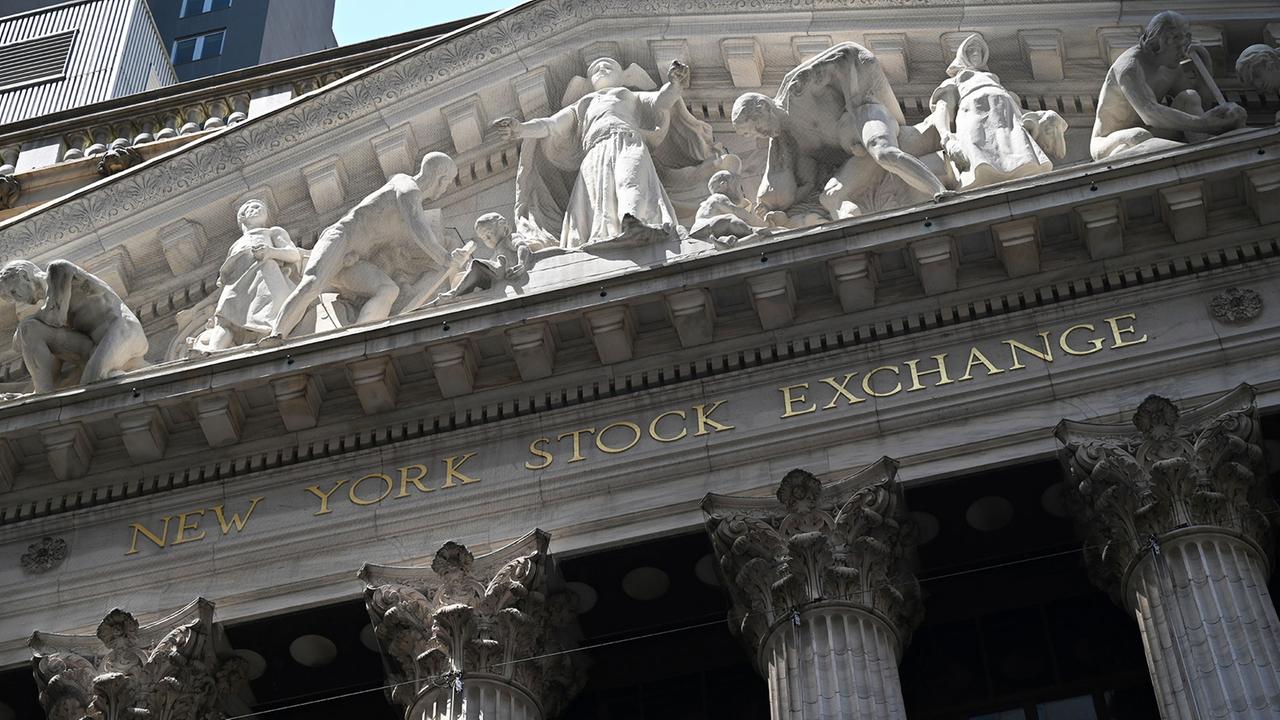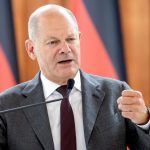market report
The Wall Street indices did not find a direction for a long time today, but ended up closing higher. After the recent turbulence, New York also had a conciliatory end to the week.
On Wall Street, as on the European stock exchanges before it, there is much calmer today. Fears of a recession have faded into the background since yesterday's data on the labor market. After the relief rally of the previous day, the major stock indices have continued to stabilize today and have gained moderately.
“The fear of a recession in the USA was exaggerated,” said DZ Bank analyst Christian Reicherter. Before the weekend, it was time to take a deep breath, as there were no further economic data on the schedule.
The leading Dow Jones index closed at 39,497 points, a daily gain of 0.13 percent. It fluctuated today between 39,230 and 39,628 points by around one percent. The broad market S&P 500 index advanced by 0.47 percent. The technology exchange Nasdaq rose by 0.51 percent, and the Nasdaq 100 index gained 0.54 percent to 18,513 points. The three indices have thus recovered significantly from their lows on Monday.
At first it did not look like the week would end on a positive note. However, reassuring words from a leading US central banker have given investors some confidence.
It is considered a given that the Fed will loosen its monetary policy in September. Stock market traders interpreted the latest statements by US central banker Jeff Schmid as confirmation of this. The head of the Federal Reserve Bank of Kansas City, who is considered an advocate of a more restrictive monetary policy, had spoken positively about the development of the economy and inflation and promised an adjustment of monetary policy. Currently, around half of investors expect an interest rate cut of half a percentage point. The rest are guessing a quarter of a percentage point.
According to portfolio manager Marie de Leyssac of asset manager Edmond de Rothschild, investors will be monitoring upcoming economic data for possible signals of a US recession and examining all statements from central bankers for clues about monetary policy. They are therefore eagerly awaiting the annual central bank meeting in Jackson Hole, Wyoming, at the end of August.
“Investors will examine US economic data such as the Empire State Index, the Philadelphia Fed Index and initial unemployment claims for any signs of a recession,” say economists at Landesbank Hessen-Thüringen (Helaba) in their outlook for the coming week. Inflation is also of interest. Inflation is still above the US Federal Reserve's target of two percent, which limits the scope for interest rate cuts. The publication of producer and consumer prices for July on Tuesday and Wednesday respectively should therefore attract increased attention.
News from the corporate sector was almost in short supply today. However, Expedia shares were in demand, rising by 10.2 percent. The online booking portal delivered surprisingly strong quarterly results, but forecast full-year targets below market expectations.
Investors apparently viewed this outlook as conservative, said analyst Thomas Champion of investment bank Piper Sandler. Other analysts pointed to the low expectations following the disappointing figures from rivals AirBnB and Booking.com.
The motto on the Frankfurt Stock Exchange today was to take a deep breath. After the last week on the stock exchange caused ups and downs, things were much calmer today. The DAX closed in quiet trading at 17,722 points, an increase of 0.24 percent. On a weekly basis, the German leading index managed a small gain of around 0.3 percent.
MDAX and SDAX, the second-tier indices, rose slightly more strongly and were supported by robust corporate results. The MDAX rose 0.59 percent to 24,249 points.
“Last week started with fear and ended with hope,” commented Ulrich Kater, chief economist at Dekabank. “Investors took advantage of the price declines to increase their share positions. And as a result, prices recovered somewhat, although the overall picture remained characterized by uncertainty and volatility,” said Kater.
The new unemployment figures from the USA were a relief yesterday. Weekly initial claims fell more sharply than they have in around eleven months. This indicates that the labor market is more robust than the latest data would suggest, according to the Landesbank Baden-Württemberg, thereby dampening recession fears on Wall Street, which are considered to be the real trigger for the recent stock market volatility.
The other world markets could not and cannot escape the developments on the US stock exchanges. Even the continuation of the domestic reporting season did not change this. In addition, the events in the Middle East and Ukraine continue to hang over the markets like the sword of Damocles.
Among the individual stocks in the DAX, Rheinmetall continued its upward trend and – as on the previous day – increased significantly by 5.2 percent to 538.40 euros. The shares are thus continuing to head towards their record high of almost 572 euros reached in April. Vonovia, the only real estate group in the leading index, was also in demand. LEG Immobilien was also one of the biggest winners in the MDAX according to business figures, with an increase of over five percent.
LEG significantly limited its losses in the first half of the year and only had to write down the value of its portfolio by 1.6 percent. Industry leader Vonovia had already announced at the half-year mark that it had left the real estate crisis behind it. Vonovia had written down the value of its holdings by 1.7 percent in the first half of the year.
“The devaluation cycle is coming to an end and we are seeing a revival in the transaction market,” said LEG CEO Lars von Lackum. “We expect values to stabilize significantly in the second half of the year,” he added. Rapidly rising interest rates from the European Central Bank (ECB) and high construction costs caused problems for real estate companies last year. Real estate prices collapsed. Numerous project developers went bankrupt.
At the end of a turbulent week, the euro has barely moved. The common currency was last traded at 1.0917 dollars in US trading. The euro was thus slightly below the level from early trading. The European Central Bank also set the reference rate at 1.0917 (Thursday: 1.0930) dollars.
The euro is stabilizing after the losses of the previous day. Yesterday, the better-than-expected weekly data from the US labor market gave the dollar a boost, while the euro temporarily fell below 1.09 dollars.
Inflation data from Germany did not move the markets. In July, the annual rate rose from 2.2 percent in the previous month to 2.3 percent. This confirmed an initial estimate as expected by economists. Otherwise, no important data was published in the eurozone and the USA.
In terms of raw materials, crude oil prices are trending upwards in the evening. Over the course of the week, they benefited from supply fears amid the escalating Middle East conflict, in which Israel is waiting for an impending attack from Iran and its proxies. Brent crude oil from the North Sea recently cost 0.6 percent more at $79.52 per barrel (159 liters). The US light oil grade WTI was quoted 0.9 percent higher at $76.77.
Bitcoin and other cryptocurrencies are on the rise again last Monday after the worst price slump in more than two years. During the night, the Bitcoin price temporarily rose to over 62,000 US dollars, but finally fell back to 60,500 dollars.
Almost a week ago, on “Black Monday,” the price of the oldest and best-known cryptocurrency had temporarily fallen below the $50,000 mark, reaching its lowest level since February. The second most important cryptocurrency, Ether, also recovered significantly at the end of the week.
Esprit is closing all its stores in Germany by the end of the year. This means that the insolvent fashion group will disappear from pedestrian zones and around 1,300 employees will lose their jobs. The insolvency administrator only managed to sell the “Esprit” brand; business operations at the headquarters in Ratingen near Düsseldorf and in the 56 remaining own stores will be discontinued, the company announced today.
Lanxess' final quarterly figures surprised investors positively today. The adjusted operating result (EBITDA) was in line with the advance announcement, but a look at the divisions showed that Lanxess performed better than the market expected everywhere, wrote analyst Chris Counihan of Jefferies. In addition, the free cash flow for the quarter was positive. The share was one of the biggest winners in the MDAX.
Jenoptik shares have accelerated their recent price recovery following encouraging quarterly figures on Friday. The technology group's shares recently rose by around 10 percent, making them the top performers in the MDAX. At the beginning of the week, Jenoptik had reached its lowest level since November at 23.44 euros in the wake of the turmoil on the overall market. The price has now recovered by around a sixth of this.
Jenoptik earned more in the second quarter thanks to higher demand in Europe and performed better than experts expected. After five quarters of decline, the technology group's order intake increased again year-on-year, wrote analyst Michael Kuhn of Deutsche Bank. Sales and operating profit also exceeded expectations. From the perspective of Jefferies analyst Henrik Paganetty, the order trend is recovering sooner than expected and Jenoptik has performed strongly.
Higher revenues from TV advertising and streaming drove the RTL Group in the first half of the year. Compared to the previous year, total revenues rose by 1.8 percent to almost 2.9 billion euros, as the MDAX-listed media group announced today. This meant that ProSiebenSat.1's competitor in the streaming segment again benefited from a significant increase in subscribers and a sharp rise in revenues. In contrast, revenues from the Fremantle production business fell. The RTL Group attributed this to timing effects.
Things are getting serious with the new factory of the Taiwanese chip manufacturer TSMC in “Silicon Saxony” in Dresden. “The groundbreaking ceremony for this joint venture will take place on August 20,” said Jochen Hanebeck, CEO of the German semiconductor manufacturer Infineon, which has a ten percent stake in the plant, to the “Süddeutsche Zeitung”. The construction of the new Infineon factory in the north of Saxony's state capital is also progressing well. The machines should arrive from September 2025 and production should begin the following year. “So we are right on schedule.” Infineon wants to invest five billion euros in this expansion of its production in Dresden – and thus create over 1,000 new jobs.
…




